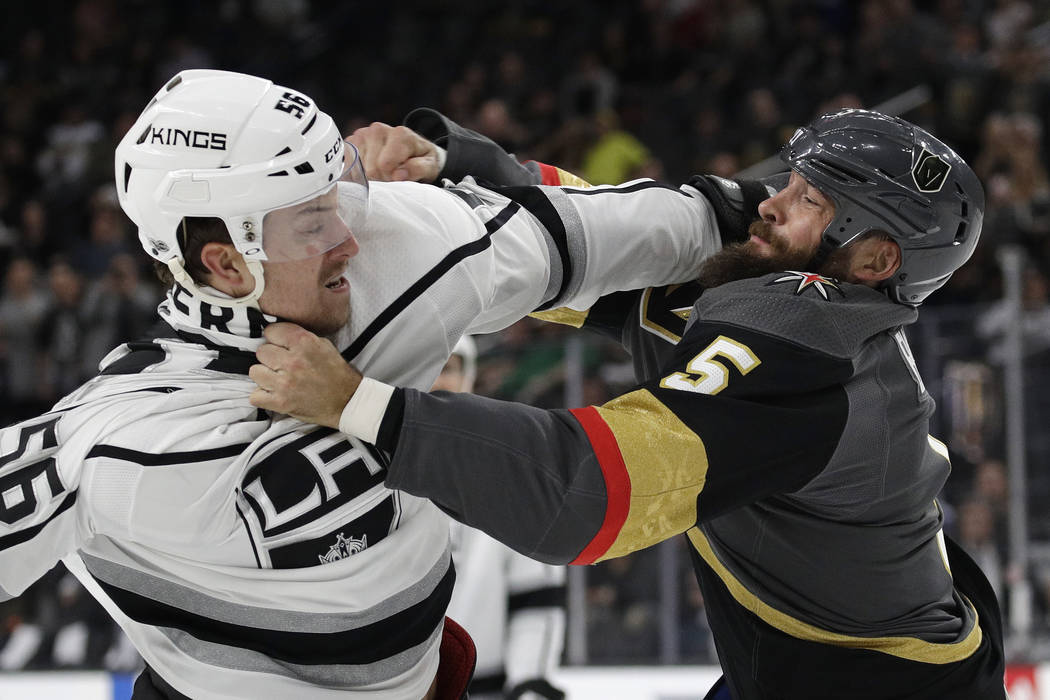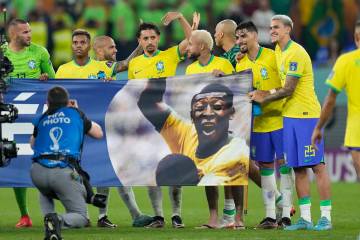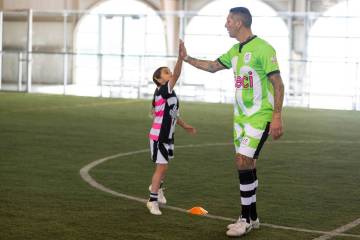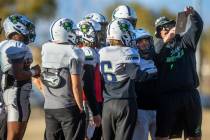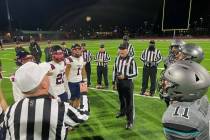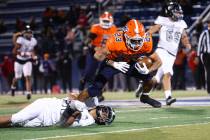NHL fights continue to decline, including with Golden Knights
If Rodney Dangerfield were still alive, he might be the only one who would take exception to what the Golden Knights have accomplished so far during their inaugural season.
“I went to a fight the other night and a hockey game broke out,” the legendary comedian famously said.
The chance of a fight breaking out at a Knights game was virtually nonexistent during the 2017-18 regular season.

The Knights dropped the gloves only 16 times, ranking 27th among the 31 NHL teams in fisticuffs. Only San Jose, Winnipeg, Columbus and Carolina fought less. The Los Angeles Kings, whom the Knights face Wednesday night in Game 1 of their first-round series, ranked eighth with 30 bouts.
With the playoffs looming, don’t expect the Knights to suddenly start putting up a fight now. At least not a literal one.
Playoff hockey has a reputation for being close checking and low-scoring with a paucity of rough stuff. With so much riding on every game, teams simply cannot risk instigating a fight and giving the other side a power play, or having key players in the penalty box serving five-minute major penalties.
Combine that mindset with a precipitous drop in fighting overall that continues to plummet, and it’s easy to see why the man manning the penalty box gate might want to bring a book of crossword puzzles to the arena during the playoffs.
Engelland swings
“(Tough) guys coming in now need to be able to play a normal role as well,” Knights alternate captain Deryk Engelland said of the enforcer role having virtually been eliminated and the decrease in fighting since he turned pro.
“Back in the day it was more a few lines going, with your third and fourth lines sprinkled in. Now it’s all four lines rolling and you’ve got to play a complete game. There still is (fighting) here and there. But a lot of guys aren’t doing it anymore. When you’re (ahead) in games on the road, you don’t want to get the crowd into it with a fight and stuff like that. So it’s a little different now than it used to be, for sure.”
Even Engelland plays a lot differently than he used to.
Since turning pro in 1988-89, he has accumulated more than 100 penalty minutes in eight seasons with a high of 199 in 2002-03 when he skated for the Moose Jaw Warriors of the rambunctious Western Hockey League. As recently as last year, when he played in 81 of 82 games for the Calgary Flames, the full-time resident of Las Vegas accrued 85 penalty minutes.
This season he had only 24.
Never one to back down from a fight, Engelland was a participant in only one during the regular season. He and the Kings’ Kurtis MacDermid dropped gloves on Sept. 26. Dropyourgloves.com scored it a draw.
Even more remarkable than Engelland scrapping only once during the regular season is that he is tied with 11 other Knights for third place in fights. Luca Sbisa and Brayden McNabb are the only Knights who have thrown knuckle sandwiches multiple times, and each has had but two fights.
It should be noted that midseason acquisition Ryan Reaves fought six times, but all were with Pittsburgh. When he was added to the roster and the team went into a minifunk, Knights fans complained about the added muscle disrupting team chemistry.
When Gerard Gallant was named coach, many local hockey enthusiasts expected the Golden Knights to adopt an aggressive style mirroring the man behind the bench when he played. Gallant liked to fight almost as much as he liked to score goals. He tallied 30 or more goals in four seasons for the Red Wings during which he also was assessed more than 200 minutes in penalties.
Given the Knights’ free-flowing skating style that emphasizes speed rather than brawn, one would think he had been a perennial contender for the Lady Byng Trophy for sportsmanship.
Before the Knights departed on a season-ending road trip, Gallant was asked about the first round of the playoffs becoming more “unstructured” than the regular season as teams attempt to send messages and establish postseason tones.
“I wouldn’t say unstructured,” he said about how the team would approach a best-of-7 series with the more physical Los Angeles Kings, before it was known it would be the Kings. “I would say there’s more energy, there’s more contact, there’s more effort out there.
“Guys work hard, they compete hard, they’re pretty excited to get in the playoffs. It’s like I said, after a game or after two games or after the first round, you see a different style of play.
“We’re not going to change the way we play. I’m saying there’s more energy in the (first-round) games. A lot of the guys in the NHL today are not guys who pound the body all the time. Probably the first few shifts of the first game, more guys will finish checks.”
Pugnacious playoffs
Back in the long ago days when enforcers roamed the hockey planet wreaking great havoc, the Philadelphia Flyers and Montreal Canadiens were a couple of teams known for finishing their checks.
Especially the Flyers. The Flyers of yesteryear liked to finish checks with their fists.
It was May 14, 1987, that the Flyers and Canadiens squared off in what many consider the greatest brawl in Stanley Cup playoffs history.
It started before the game.
Before the officials were even on the ice.
At the end of pregame warmups, after most players had adjourned to their dressing rooms, Montreal’s Claude Lemieux attempted to fire a puck into the empty Philadelphia net — a customary act of Lemiuex’s which the Flyers’ Ed “Boxcar” Hospodar and goalie Glenn “Chico” Resch took as an insult.
They jumped onto the ice and started a donnybrook that lasted 10 minutes, mostly because the referee and linesmen were nowhere to be found. Players from both sides charged from their dressing rooms sans jerseys and other equipment to take part in the free-for-all.
For which no penalties were assessed, because this all happened before the first puck was dropped.
Thunder down under
Longtime Las Vegas hockey fans may recall the first playoff series in the city’s pro hockey existence. During the 1994 International Hockey League first-round Turner Cup playoff series pitting the San Diego Gulls against the Las Vegas Thunder, Las Vegas’ Jim Kyte kneed San Diego star Hubie McDonough during the last minute of a game the Thunder was destined to lose.
The brawl that ensued turned San Diego Arena into a WWE cage match.
The teams were assessed 151 minutes in penalties and nine game misconducts, six of which went to the Thunder. Clint Malarchuk, the Las Vegas goalie, was responsible for two. The “Cowboy Goalie” also received two minutes for leaving his crease, two minutes for instigating a fight and five minutes for participating in one when he skated the length of the ice to punch out Gulls counterpart Allan Bester in a mismatch of former NHL netminders.
The Thunder’s Marc Rodgers got into a shouting match with fans behind the Las Vegas bench. Rodgers hurled his stick into the crowd, breaking the nose of a female fan.
Afterward, in a scene right out of the movie “Slap Shot,” police knocked on the door of the Thunder dressing room, looking for Rodgers. By then he was hiding under bags in the back of the equipment truck for the ride back to Las Vegas.
Playoff hockey. You gotta love it.
Bob Strumm, who was the Thunder general manager and went on to become director of pro scouting for the NHL’s Columbus Blue Jackets, said brawls such as those rarely happen anymore, because the game has changed so drastically.
“It’s pretty simple from my end,” the longtime Las Vegas resident said about the dearth of fighting. “The game has become so fast and so wide open with all the rule changes since the turn of the century with no holding and no hooking and no interference in center ice. A lot of the bigger and slower guys (qualities that describe most enforcers) can’t play in the league anymore.”
Strumm agrees with Engelland. He said whereas most teams played with two lines of skaters and a third checking line a generation ago, now almost every NHL team plays four lines of skaters on almost every night.
“There’s no room for the tough guy,” he said.
Hammer’s time ceases
NHL fighting statistics then and now gives credence to Strumm’s opinion.
During the the 1987-88 season, when the league had only 21 teams, there were 1,100 fights in 841 games — an average of 1.31 fights per game, an all-time high.
During the just concluded regular season, 31 teams combined for 322 fights in 1,271 games — an average of 0.25 fights per game, threatening the all-time low of 0.19 during the 1961-62 season when only six teams skated.
Bob “The Hammer” Fleming, who owns a bar and lounge in Henderson called Hammer’s, spent 12 seasons as a minor league tough guy during which he logged three 20-goal seasons and eight seasons of at least 100 penalty minutes, with a high of 219.
He agrees with Strumm’s view that new hockey rules have by and large phased enforcers out of the game, while adding that it’s probably a good thing most of the time.
But not all of the time.
“First of all, I want to say the game is in great shape,” Fleming said recently while seated in a back booth at his bar just around the corner from the College of Southern Nevada campus. “It’s a really good product on the ice, (although) I’d like to see a little more hitting.”
When Fleming was with the Buffalo Sabres, he fought legendary tough guy Stu “The Grim Reaper” Grimson of the Chicago Blackhawks twice in the same period during a preseason game at old Chicago Stadium.
“When guys throw a big hit and want to fight right away, I don’t think that’s the right time,” Fleming said. “But when somebody takes advantage of one of your smaller guys, or when there’s some bad use of the stick or a really cheap hit from behind or something, I think you could cut some of that down with guys just doing their job of enforcing.
“But there’s really not much of the enforcer role left — very minuscule.”
Fleming also mentioned how rules adjustments, such as players being assessed a penalty for instigating fights, changed how the game is coached and played.
“I think one part of it is guys are a little leery of some of these potent power plays,” said Fleming, who also engaged former Thunder tough guy Kirk Tomlinson in a couple of memorable brawls (one before the game started) that can be viewed on YouTube. “If someone takes a double minor or a five-minute penalty without somebody being on the other side of that, (the other team) might score a couple of goals and really put you in a hole.
“It’s so competitive. You look at the Western division from third to eighth where there’s a difference of like six points. It’s really a battle of attrition to get to the playoffs. But then you look at the L.A. Kings and they’re grinding people up pretty good.
“They’re not fighting a lot, but they’re hitting and they’re cutting people off and they’re forcing them down the wall and doing the trap and those kind of things so …”
So, as Gerard Gallant says, you might see the Golden Knights try to finish checks in their first-round series against the Kings that starts Wednesday night at T-Mobile Arena.
“But we’re fast,” said Bob “The Hammer” Fleming, a proud Knights season-ticket holder.
“That’s our forte.”
More Golden Knights: Follow all of our Golden Knights coverage online at reviewjournal.com/GoldenKnights and @HockeyinVegas on Twitter.
Contact Ron Kantowski at rkantowski@reviewjournal.com or 702-383-0352. Follow @ronkantowski on Twitter.



